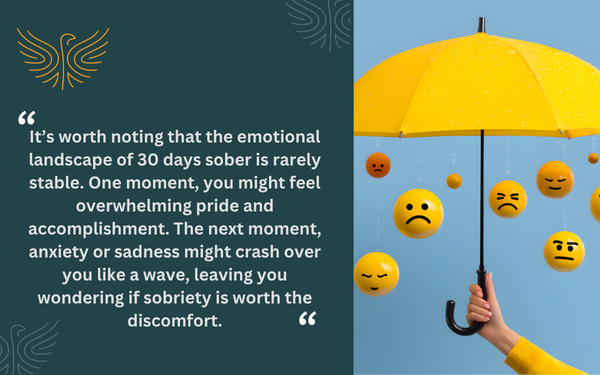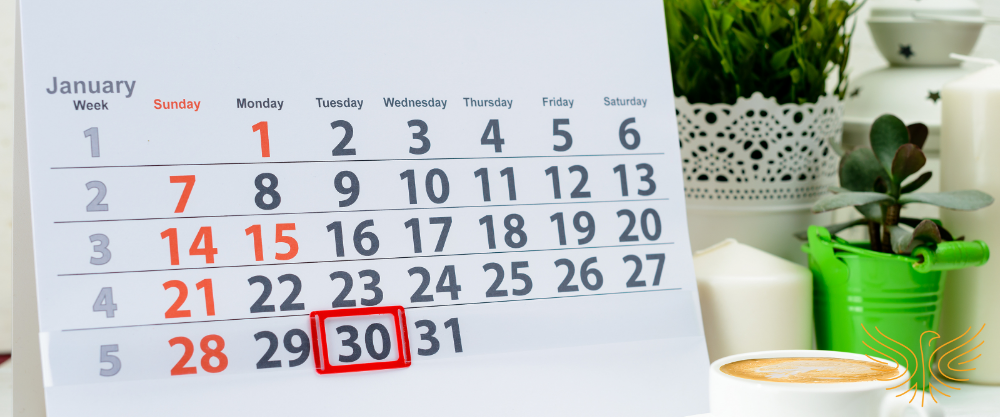30 days sober is often one of the first significant milestones in recovery—tangible proof that change is happening. It's a moment filled with a complex mix of emotions, often including pride in what you’ve accomplished, relief that you made it this far, fear about what comes next, and tentative hope that maybe, just maybe, this time will be different.
Whether you’re personally celebrating 30 days, a family member watching someone you love rebuild their life, or a friend trying to understand what this journey feels like, this article offers a compassionate look at what this milestone truly means.
_______________________________________________________
The Physical Shifts After 30 Days
After 30 days, the body begins to show visible signs of healing. After weeks or years of being flooded with substances, your physical systems finally have a chance to recalibrate and repair themselves.
Common physical improvements at 30 days include:
- Better sleep quality (deeper rest and waking up feeling genuinely refreshed)
- Improved mental clarity (sharper thinking, better memory, and easier decision-making)
- Reduced cravings
- Healthier appearance (clearer skin, brighter eyes, and better overall complexion)
- Normalized appetite
- Increased energy (sustained energy throughout the day without crashes)
Take note of the above! Every small change matters and is living proof that you’re on the right path.
_______________________________________________________
Emotional Highs and Lows
It’s worth noting that the emotional landscape of 30 days sober is rarely stable. One moment, you might feel overwhelming pride and accomplishment. The next moment, anxiety or sadness might crash over you like a wave, leaving you wondering if sobriety is worth the discomfort.

This emotional volatility is completely normal. For months or years, substances acted as a buffer between you and your feelings. Without that chemical cushion, you’re now feeling everything at full intensity, often for the first time in a long time. Your brain is relearning how to process emotions naturally, and that recalibration takes time.
For instance, small frustrations that you once would have drowned in alcohol or dulled with drugs now demand your full attention. At the same time, positive emotions also feel more vivid. A genuine laugh with a friend, a beautiful sunset, the satisfaction of completing a task—these moments carry weight and meaning they maybe didn’t before.
Hope is perhaps the most precious and frightening emotion at 30 days. You start to believe that lasting change might actually be possible, but with that hope comes fear—fear of letting yourself down again or perhaps fear that this fragile progress could shatter at any moment. Again, this is normal. Give yourself grace and space. Use the tools provided to you in therapy and rehab, such as journaling and other techniques, to navigate through.
_______________________________________________________
Rebuilding Daily Life and Relationships
At 30 days sober, the challenge is usually rebuilding a life that once revolved around substance use. Healthy routines—such as regular sleep, planned meals, therapy, and exercise—provide stability and anchors when cravings or uncertainty arise.
Relationships at this stage, however, are delicate. Loved ones may feel hopeful but cautious; 30 days is a strong start, but it doesn’t erase years of hurt. Trust is earned through consistent action, not quick promises.
Loneliness often surfaces, too. Distancing from old using friends can leave social gaps, making recovery meetings, sober living, and support networks especially valuable. These communities offer acceptance without explanation—they already understand why “just one drink” isn’t an option.
Accountability is equally important. Sponsors, sober peers, therapists, or housemates can notice when you’re slipping and provide encouragement when willpower alone isn’t enough.
_______________________________________________________
Looking Ahead Beyond 30 Days
Reaching 30 days sober is a significant achievement worthy of celebration—but it’s essential to recognize that it’s a foundation, not a finish line. After all, recovery is an ongoing process of building a life where sobriety makes sense and feels worthwhile.
Setting goals becomes important at this stage because they give direction and purpose when life can still feel uncertain. Short-term goals might include attending meetings, trying new sober activities, or reaching out when triggered. Long-term goals help you envision what you’re working toward—relationships to rebuild, career aspirations to pursue, hobbies to rediscover.
At the same time, continued support remains essential beyond the first 30 days. Outpatient treatment programs provide ongoing therapy and medical support. Group programs like 12-step meetings, SMART Recovery, or faith-based recovery communities offer long-term connections. Sober communities can also help you build a social life that supports rather than threatens your sobriety.
One of the most important mindset shifts is understanding that recovery is measured in progress, not perfection. You will have difficult days. You will make mistakes. These moments don’t erase your progress—they’re part of the learning process. What matters is how you respond when you stumble.
If you’ve made it to 30 days sober, this is something to celebrate. And it’s okay to feel uncertain and a mix of emotions. And if you’re just starting out, know help is available and recovery is possible. At Freedom Recovery Centers (FRC), our team is here to help. Together, we can help you get on track toward a life you love and want. Call us at 804-635-3746 to take that first step toward your goals.
.svg)






.svg)

.svg)



.svg)
